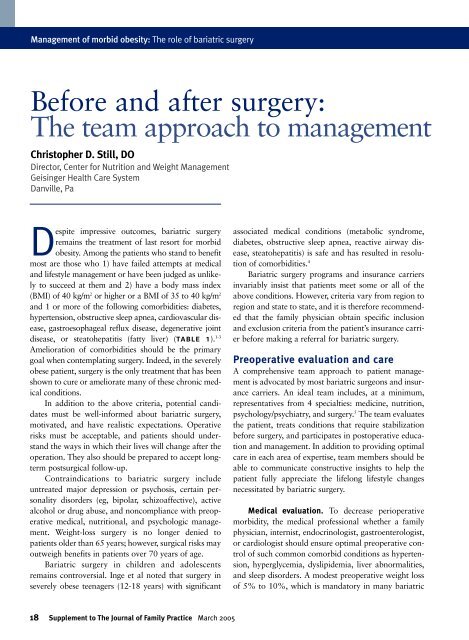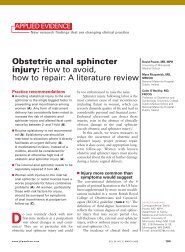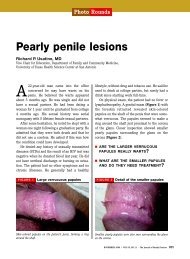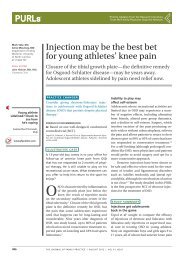Management of morbid obesity - The Journal of Family Practice
Management of morbid obesity - The Journal of Family Practice
Management of morbid obesity - The Journal of Family Practice
Create successful ePaper yourself
Turn your PDF publications into a flip-book with our unique Google optimized e-Paper software.
<strong>Management</strong> <strong>of</strong> <strong>morbid</strong> <strong>obesity</strong>: <strong>The</strong> role <strong>of</strong> bariatric surgery<br />
Before and after surgery:<br />
<strong>The</strong> team approach to management<br />
Christopher D. Still, DO<br />
Director, Center for Nutrition and Weight <strong>Management</strong><br />
Geisinger Health Care System<br />
Danville, Pa<br />
Despite impressive outcomes, bariatric surgery<br />
remains the treatment <strong>of</strong> last resort for <strong>morbid</strong><br />
<strong>obesity</strong>. Among the patients who stand to benefit<br />
most are those who 1) have failed attempts at medical<br />
and lifestyle management or have been judged as unlikely<br />
to succeed at them and 2) have a body mass index<br />
(BMI) <strong>of</strong> 40 kg/m 2 or higher or a BMI <strong>of</strong> 35 to 40 kg/m 2<br />
and 1 or more <strong>of</strong> the following co<strong>morbid</strong>ities: diabetes,<br />
hypertension, obstructive sleep apnea, cardiovascular disease,<br />
gastroesophageal reflux disease, degenerative joint<br />
disease, or steatohepatitis (fatty liver) (TABLE 1). 1-3<br />
Amelioration <strong>of</strong> co<strong>morbid</strong>ities should be the primary<br />
goal when contemplating surgery. Indeed, in the severely<br />
obese patient, surgery is the only treatment that has been<br />
shown to cure or ameliorate many <strong>of</strong> these chronic medical<br />
conditions.<br />
In addition to the above criteria, potential candidates<br />
must be well-informed about bariatric surgery,<br />
motivated, and have realistic expectations. Operative<br />
risks must be acceptable, and patients should understand<br />
the ways in which their lives will change after the<br />
operation. <strong>The</strong>y also should be prepared to accept longterm<br />
postsurgical follow-up.<br />
Contraindications to bariatric surgery include<br />
untreated major depression or psychosis, certain personality<br />
disorders (eg, bipolar, schizoaffective), active<br />
alcohol or drug abuse, and noncompliance with preoperative<br />
medical, nutritional, and psychologic management.<br />
Weight-loss surgery is no longer denied to<br />
patients older than 65 years; however, surgical risks may<br />
outweigh benefits in patients over 70 years <strong>of</strong> age.<br />
Bariatric surgery in children and adolescents<br />
remains controversial. Inge et al noted that surgery in<br />
severely obese teenagers (12-18 years) with significant<br />
18 Supplement to <strong>The</strong> <strong>Journal</strong> <strong>of</strong> <strong>Family</strong> <strong>Practice</strong> March 2005<br />
associated medical conditions (metabolic syndrome,<br />
diabetes, obstructive sleep apnea, reactive airway disease,<br />
steatohepatitis) is safe and has resulted in resolution<br />
<strong>of</strong> co<strong>morbid</strong>ities. 4<br />
Bariatric surgery programs and insurance carriers<br />
invariably insist that patients meet some or all <strong>of</strong> the<br />
above conditions. However, criteria vary from region to<br />
region and state to state, and it is therefore recommended<br />
that the family physician obtain specific inclusion<br />
and exclusion criteria from the patient’s insurance carrier<br />
before making a referral for bariatric surgery.<br />
Preoperative evaluation and care<br />
A comprehensive team approach to patient management<br />
is advocated by most bariatric surgeons and insurance<br />
carriers. An ideal team includes, at a minimum,<br />
representatives from 4 specialties: medicine, nutrition,<br />
psychology/psychiatry, and surgery. 5 <strong>The</strong> team evaluates<br />
the patient, treats conditions that require stabilization<br />
before surgery, and participates in postoperative education<br />
and management. In addition to providing optimal<br />
care in each area <strong>of</strong> expertise, team members should be<br />
able to communicate constructive insights to help the<br />
patient fully appreciate the lifelong lifestyle changes<br />
necessitated by bariatric surgery.<br />
Medical evaluation. To decrease perioperative<br />
<strong>morbid</strong>ity, the medical pr<strong>of</strong>essional whether a family<br />
physician, internist, endocrinologist, gastroenterologist,<br />
or cardiologist should ensure optimal preoperative control<br />
<strong>of</strong> such common co<strong>morbid</strong> conditions as hypertension,<br />
hyperglycemia, dyslipidemia, liver abnormalities,<br />
and sleep disorders. A modest preoperative weight loss<br />
<strong>of</strong> 5% to 10%, which is mandatory in many bariatric









